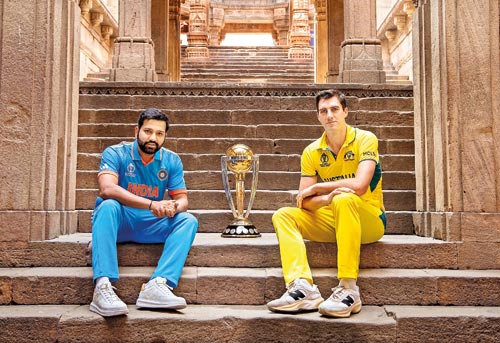Will it be Australia’s sixth or India’s third?

India skipper Rohit Sharma and Australia skipper Pat Cummins with the ICC Men's Cricket World Cup 2023 trophy at Adalaj Stepwell in Gujarat
The defending champions crashed out. The runners-up in 2019 failed to make it to their third consecutive final. Proteas choked once again. Afghanistan showed grit but failed to make it, and after 47 matches of exciting and dramatic events, it’s a battle between the 2003 finalists—India and Australia–in front of a legion of home fans.
They began the campaign facing each other on October 8. After nearly six weeks, they will meet for one last time in the 13th edition of the ICC Men’s World Cup at the Narendra Modi Stadium in Ahmedabad today.
It will decide the victor. Will it be Australia’s sixth or India’s third?
The hosts were invincible in the tournament, winning 10-out-of-10 and putting them a single win away from creating a fairytale ending to a near-perfect campaign. Their batting has flourished. Their bowling has been exceptional. Their fielding has been above par. The Indians have ticked all the boxes. But can they handle the pressure and expectations of 1.4 billion people to win their first global title since the 2013 Champions Trophy.
India has three batters with over 500 runs. Virat Kohli is at the helm, having scored 711 runs with three centuries and five half centuries at an astounding average of 101.57. Skipper Rohit Sharma has amassed 550 runs, as has Shreyas Iyre, who has 526 runs with two centuries.
KL Rahul and Shubman Gill are all among runs, helping their smooth sailing in the tournament. Batting has not disappointed them. Even when the top order struggled, their middle-order fired, and vice versa, to make them the most consistent batting units in the game.
Mohammed Shami has been outstanding. He leads the bowling charts with 23 wickets in only six games, including three-five wicket hauls. His ability to generate late swing has undone many batters and his line has been impeccable. Jasprit Bumrah has 18. Ravindra Jadeja with 16, Kuldip Yadav with 15 and Mohammed Siraj with 13 have all contributed to India’s cause but it’s Shami—the late entrant who has stood out.
It’s been India’s World Cup so far. Sharma has led his team fiercely. He has soaked up the pressure of being India’s captain and is smart enough to keep his star-heavy team rolling smoothly in crunch games. Can he do it once more?
Australia, on the other hand, had a rollercoaster ride. Losing to India and South Africa at the start put their campaign on the line. But since beating
Sri Lanka by 5 wickets in their third game, Australia has been unstoppable.
Along the way, they were tested to the hilt. Against Afghanistan, they were 91 for 7 in the 19th over chasing, 292 to win, but a magical innings from Glenn Maxwell—an unbeaten 201 of 128 despite battling cramps under the Mumbai heat—took them to an unlikely win.
David Warner is their top scorer with 528 runs including two centuries and two half-centuries. He is followed by Mitchell Marsh (426 runs) who hit an unbeaten 177 against Bangladesh in their last group game. Apart from the trio, others haven’t really fired. In the semi-final, they just scraped through, chasing a modest 212 set by South Africa on the back of Travis Head’s half-century.
But Australia has a varied bowling attack to restrict the opposition from piling up too much, even defending relatively low scores. Adam Zampa has been superb. With 22 wickets in 10 games, he sits in the second place of the highest wicket-takers list in the tournament. Mitchell Starc, Josh Hazelwood and Pat Cummins are match winners. With part-time options of Marsh, Maxwell and Head, they have variety in the bag.
Sharma and Co. may be favourites and will be boosted by their premier Narendra Modi and those thousands of vociferous Indian supporters clad in sky-blue Indian jersey. But Australia has the experience of playing high-octane matches and this could prove decisive as both teams battle for the one last time.


